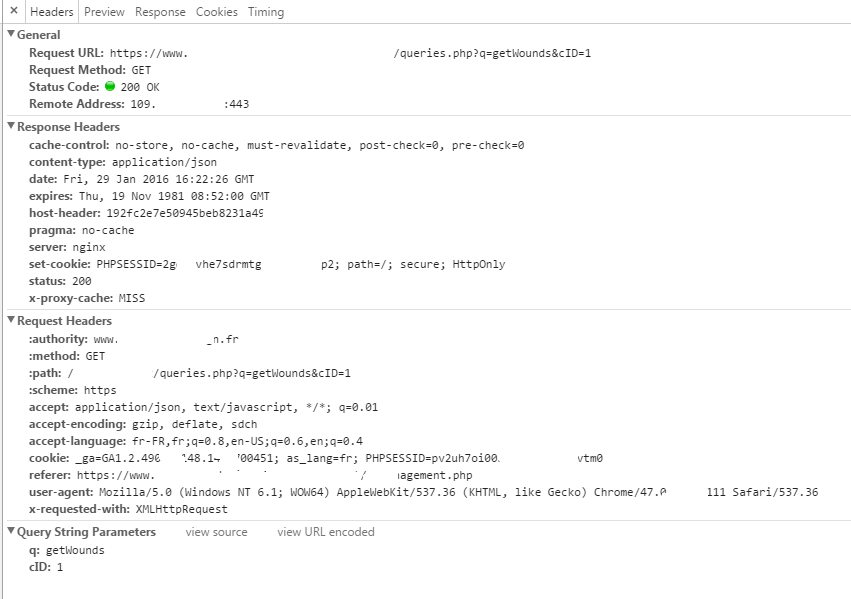I am performing a standard getJSON query from a page which is session protected:
$.getJSON('queries.php',{q: 'updateEvent', param1: p1},
function(data){
...
}
);
On my session constructor I have set the following :
function startSession()
{
ini_set('session.use_only_cookies', SESSION_USE_ONLY_COOKIES);
$cookieParams = session_get_cookie_params();
session_set_cookie_params(
$cookieParams["lifetime"],
$cookieParams["path"],
$cookieParams["domain"],
SESSION_SECURE,
SESSION_HTTP_ONLY
);
session_start();
if ( SESSION_REGENERATE_ID )
session_regenerate_id(SESSION_REGENERATE_ID);
}
If I set SESSION_REGENERATE_ID to true, then my getJSON sends a token, but receives a different one, making the request fail. So for the moment I'm dealing with SESSION_REGENERATE_ID set to false.
Is there a way to make getJSON work in such conditions ?
EDIT : all files are under the same domain.
We have index.php where the js is included, we have queries.php which is the php file called by the ajax requests, we have s_session.php which includes the constructor written above.
Files index.html and queries.php are both protected at the begining this way :
include "s_session.php";
if(!$login->isLoggedIn()) {
header('Content-Type: application/json');
echo json_encode(array('content' => 'Login failed'));
exit;
}
The PHPSESSID is in the header of the ajax request under set-cookie. The PHPSESSID returned in the answer is different, as expected from session_regenerate_id.
If SESSION_REGENERATE_ID is set to FALSE the requests are going through without problem. If it is set to TRUE, then I get the error message "Login failed".
Here is the isLoggedIn() :
public function isLoggedIn() {
//if $_SESSION['user_id'] is not set return false
if(ASSession::get("user_id") == null)
return false;
//if enabled, check fingerprint
if(LOGIN_FINGERPRINT == true) {
$loginString = $this->_generateLoginString();
$currentString = ASSession::get("login_fingerprint");
if($currentString != null && $currentString == $loginString)
return true;
else {
//destroy session, it is probably stolen by someone
$this->logout();
return false;
}
}
$user = new ASUser(ASSession::get("user_id"));
return $user->getInfo() !== null;
}
EDIT 2 : Here is the full ASSession code :
class ASSession {
/**
* Start session.
*/
public static function startSession()
{
ini_set('session.use_only_cookies', SESSION_USE_ONLY_COOKIES);
session_start();
$s = $_SESSION;
$cookieParams = session_get_cookie_params();
session_set_cookie_params(
$cookieParams["lifetime"],
$cookieParams["path"],
$cookieParams["domain"],
SESSION_SECURE,
SESSION_HTTP_ONLY
);
if ( SESSION_REGENERATE_ID )
session_regenerate_id(SESSION_REGENERATE_ID);
//$_SESSION = $s;
}
/**
* Destroy session.
*/
public static function destroySession() {
$_SESSION = array();
$params = session_get_cookie_params();
setcookie( session_name(),
'',
time() - 42000,
$params["path"],
$params["domain"],
$params["secure"],
$params["httponly"]
);
session_destroy();
}
/**
* Set session data.
* @param mixed $key Key that will be used to store value.
* @param mixed $value Value that will be stored.
*/
public static function set($key, $value) {
$_SESSION[$key] = $value;
}
/**
* Unset session data with provided key.
* @param $key
*/
public static function destroy($key) {
if ( isset($_SESSION[$key]) )
unset($_SESSION[$key]);
}
/**
* Get data from $_SESSION variable.
* @param mixed $key Key used to get data from session.
* @param mixed $default This will be returned if there is no record inside
* session for given key.
* @return mixed Session value for given key.
*/
public static function get($key, $default = null) {
if(isset($_SESSION[$key]))
return $_SESSION[$key];
else
return $default;
}
}
EDIT 3: here are the request headers and response cookie :
I noticed that the very first getJSON which is performed during the onload is successfull. All the others done after and triggered by user are unsuccessfull



$.ajaxfunction and use the extra parameterdataType:"json"to make it work like$.getJSON. Like this$.ajax({url:url,xhrFields: {withCredentials: true }, dataType:"json"});Let me know, if that works for you. – Assuasivesession_regenerate_id()must do. It's changing thePHPSESSIDactually. So, why do you call that function if you don't want to change thePHPSESSID? – AssuasiveASSessionworks. So we need more and more code to find the reasons! :) – Assuasive$.getJSON()call or multiple ones? And when exactly are those calls executed? During the page load or after that? If there are multiple calls, are they executed simultaneously and do they all fail? Please post the relevant Request & Response headers. – Bidentate